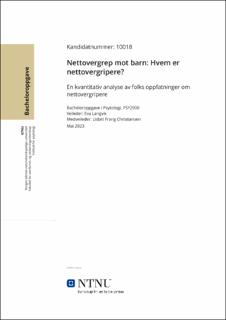| dc.contributor.advisor | Langvik, Eva | |
| dc.contributor.advisor | Frang-Christiansen, Lisbeth | |
| dc.contributor.author | Soboh, Ghazal | |
| dc.date.accessioned | 2023-07-11T17:20:40Z | |
| dc.date.available | 2023-07-11T17:20:40Z | |
| dc.date.issued | 2023 | |
| dc.identifier | no.ntnu:inspera:146342237:64242207 | |
| dc.identifier.uri | https://hdl.handle.net/11250/3077795 | |
| dc.description.abstract | Nettovergrep er et voksende samfunnsproblem som påvirkes av de stereotypiske oppfatninger om nettovergripere i samfunnet. Denne oppgaven hadde som mål å undersøke i hvilken grad generelle oppfatninger om nettovergripere stemmer overens med statistikk, og hvilken innvirkning demografiske faktorer (kjønn, alder, utdanningsnivå, og å jobbe i helsesektor og i politi og rettsvesen) har på disse oppfatningene. Spesifikt ble det undersøkt om nettovergripere ble oppfattet å ha en pedofil preferanse, om de har opplevd overgrep selv og risikoen for å begå fysiske overgrep. Data fra 454 av 608 norske deltakere som ble samlet inn gjennom et anonymt nettbasert spørreskjema ble benyttet i prosessen. Resultatene viste at folks oppfatninger om nettovergripere generelt er inkonsistent med eksisterende kunnskap om nettovergripere. Regresjonsanalyser viste at alder og det å jobbe i helsesektoren var signifikante prediktorer for oppfatningen om at nettovergripere har en pedofil preferanse. Kjønn og utdanningsnivå var også signifikante prediktorer for oppfatningen om at nettovergripere har risiko for å begå fysisk overgrep. Kvinner, unge voksne og de med lavere utdanning hadde i større grad stereotypiske oppfatninger om nettovergripere. De som jobber i helsesektoren, hadde i mindre grad stereotypiske oppfatninger enn de som jobber i andre sektorer. Ved sammenligning av de som jobber i helsesektoren, og de i politi og rettsvesen, viste resultatene at førstnevnte gruppen har en tendens til å ha stereotypiske oppfatninger i større grad enn sistnevnte gruppe. Funnene ble diskutert i lys av stereotypier, sosial læringsteori og kognitiv læringsteori. Ytterligere forskning på andre faktorer som påvirker folks oppfatninger om nettovergripere er nødvendig. | |
| dc.description.abstract | Online abuse is a growing social problem influenced by society's stereotypical perception of online abusers. The aim of this thesis was to examine the consistency between general perceptions of online abusers and statistical data, as well as the influence of demographic factors (gender, age, education level, work in the health sector, and police- and justice system) on these perceptions. Specifically, the thesis investigated whether online rapists are perceived to have a pedophile preference, whether they have experienced abuse themselves and the risk of committing physical abuse. Data from 454 out of 608 Norwegian participants who were collected through an anonymous online questionnaire was used in the process. The results indicate that people's perceptions of online abusers are generally inconsistent with existing knowledge about online abusers. Regression analysis showed that age and working in health sector were significant predictors of the perception that online abusers have a pedophilic preference. Gender and education level were also significant predictors of the perception that online abusers are at risk of committing physical abuse. Women, young adults and those with lower education tended to hold more stereotypical perceptions of online abusers. Health care workers had less stereotypical perceptions than workers in other sectors. Comparatively, health care workers tended to have stereotypical perceptions to a greater extent than police and judiciary workers. The findings were discussed in light of stereotypes, social learning theory and cognitive learning theory. However, further research is necessary to explore additional factors that influence perceptions of online abusers. | |
| dc.language | nob | |
| dc.publisher | NTNU | |
| dc.title | Nettovergrep mot barn: Hvem er nettovergripere?
En kvantitativ analyse av folks oppfatninger om nettovergripere | |
| dc.type | Bachelor thesis | |
